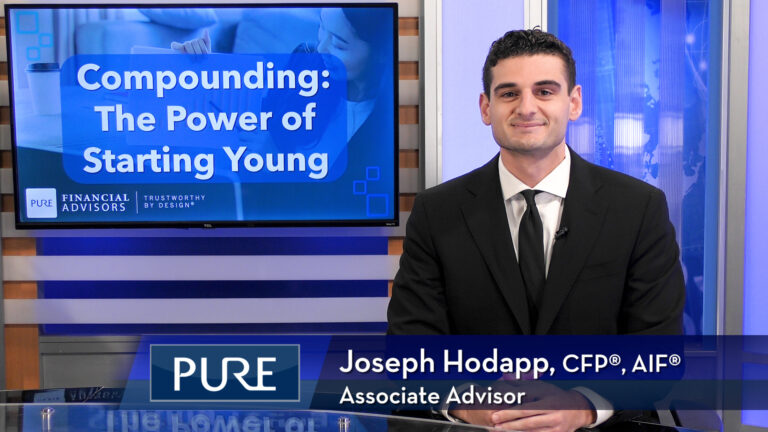From Thanksgiving to New Years Day, people are generally in a festive and giving mood. In fact, about 30% of all donations to non-profit organizations happen in the month of December. Pure’s Senior Financial Planner, Hillel Katzeff, CFP®, covers some best practices for you to give to charity.
FREE GUIDE | Charitable Giving: Steps on Informed Giving
Transcript
I love this time of year. From Thanksgiving until New Years Day, people are generally in a festive and giving mood. Not for profit organizations know this and it’s not surprising that they ask for charitable contributions during the giving season. In fact, about 30% of all donations to not for profits happen in the month of December.
So, with your heart open, and a little bit of planning, here are some of the best practices and ways for you to give to charity (in order of complexity).
- Cash – Giving cash is probably the easiest way to contribute to a charity or nonprofit. It also gives the most flexibility to the organization you chose to give to. However, it is recommended that to better document your donations, you may want to consider giving by check or credit card, rather than using cash. And since you may be feeling generous, you can make a sustainable donation to your favorite charity, by making recurring monthly or annual gifts. This will help make it easier for your favorite charity to budget and plan throughout the year.
- Stocks and Securities – If you would like to donate stocks, bonds, mutual funds you can do so if the nonprofits accept them, and many of them do. But be sure to contact the charity before you make the transfer to give them a heads up. By transferring ownership directly to a not for profit organization, you can receive a favorable charitable tax deductions. Contact your tax preparer or financial advisor to learn more about donating securities.
- Planned Giving- This means planning your giving and arranging your donations into the future. There are many options for charitable planned giving.
The easiest is leaving a bequest in your will or a living trust. You can also name a charity as a beneficiary of your life insurance policy or retirement plan.
- Estate Planning – With a little more planning you can create an Estate Plan.
This could mean that you open a Donor Advised Fund with a Community Foundation. A Donor Advised Fund can help you make donations and receive favorable tax benefits. The community foundation invests and manages your funds in an account, and they fulfill your grant recommendations or requests. They then transfer income and principal to nonprofit organizations while you are alive. When you pass away, remaining funds are distributed to your named charitable organizations and in some cases a named successor can continue to make grant recommendations.
Another estate planning strategy could be for you to create a Charitable Trust. This is more sophisticated and involves more cost, but may be worth your consideration. A Charitable Lead Trust or Charitable Remainder Trust both involve transferring assets, usually low-cost basis securities into an irrevocable trust at which time you receive a beneficial charitable tax deductions.
With a Charitable Lead Trust, a charitable organization that you choose receives a stream of income from the trust every year for a fixed number of years, then the remaining assets can be directed to you or other beneficiaries.
In the case of a Charitable Remainder Trust, annual distributions are paid to you or other beneficiaries for a set period of years. Then after that period, or at your death, remaining assets are given to the named not for profit charities that you designate and that you can change.
If these types of charitable trusts make sense for your situation, you will definitely need to consult with an estate planning attorney and financial advisor to get it set up correctly and to make sure that the required annual administration and tax filings are met.
Whatever your charitable inclination, I know that giving can make you feel good and can make also a big difference in the world. Wishing you a season of good health, light and giving.
Subscribe to our YouTube channel.
IMPORTANT DISCLOSURES:
• Investment Advisory and Financial Planning Services are offered through Pure Financial Advisors, LLC, a Registered Investment Advisor.
• Pure Financial Advisors LLC does not offer tax or legal advice. Consult with your tax advisor or attorney regarding specific situations.
• Opinions expressed are subject to change without notice and are not intended as investment advice or to predict future performance.
• Investing involves risk including the potential loss of principal. No investment strategy can guarantee a profit or protect against loss in periods of declining values.
• All information is believed to be from reliable sources; however, we make no representation as to its completeness or accuracy.
• Intended for educational purposes only and are not intended as individualized advice or a guarantee that you will achieve a desired result. Before implementing any strategies discussed you should consult your tax and financial advisors.
CFP® – The CERTIFIED FINANCIAL PLANNER™ certification is by the Certified Financial Planner Board of Standards, Inc. To attain the right to use the CFP® designation, an individual must satisfactorily fulfill education, experience and ethics requirements as well as pass a comprehensive exam. Thirty hours of continuing education is required every two years to maintain the designation.












